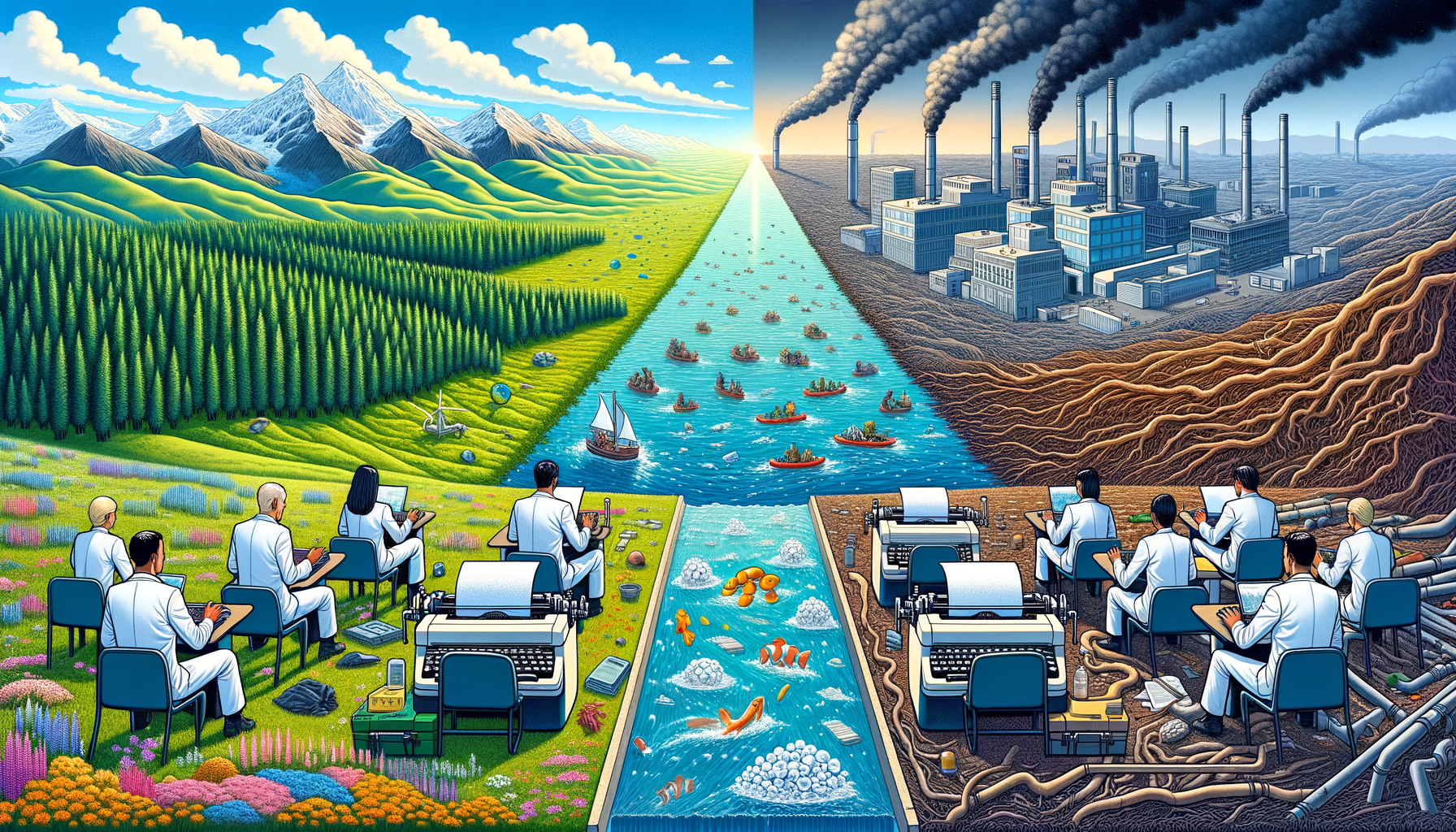
Imagine this: It’s 2024, and you’re sitting at your desk, staring at a blank document. The cursor blinks back at you, almost taunting you. You have a story to tell, a narrative to weave, but the words just won’t come. We’ve all been there, haven’t we? But what if I told you there’s a way to unlock your creative potential and banish writer’s block for good?
Enter the world of AI-powered writing tools. You might be familiar with ChatGPT, a powerful AI that can generate human-like text. But did you know there are alternatives that can take your writing to new heights? These tools are not just about replacing human writers; they’re about enhancing our capabilities, sparking our creativity, and giving us the tools to tell our stories in ways we never thought possible.
In this post, we’ll explore some of the best ChatGPT alternatives for 2024 that can help you unlock creative storytelling like never before. So, buckle up and get ready for a journey into the future of writing.
The Rise of AI in Storytelling
In the past few years, I’ve seen a fascinating shift in the world of storytelling. The rise of AI has opened up new avenues for creativity that were once unimaginable. I remember when AI was just a concept in sci-fi novels, but now, it’s a reality that’s transforming the way we write and tell stories.

AI writing tools, like ChatGPT and its alternatives, are not just about generating text. They’re about enhancing our storytelling capabilities, sparking our creativity, and giving us the tools to tell our stories in ways we never thought possible. These tools are like a co-author, a creative companion that helps us weave narratives and bring our ideas to life.
But as with any tool, it’s not just about what it can do. It’s about how we use it. And that’s where the real magic happens. When we combine our human creativity with the power of AI, we can create stories that are not just engaging and compelling, but also deeply personal and unique. And that, my friends, is the true power of AI in storytelling.
Why Look for ChatGPT Alternatives?
Now, you might be wondering, “If ChatGPT is so great, why would I need an alternative?” That’s a fair question. ChatGPT is indeed a powerful tool, but it’s not without its limitations.
- For one, it has limited knowledge of recent events. It’s like having a conversation with someone who’s been living under a rock. They can tell you all about the history of the world, but ask them about yesterday’s news, and they’re clueless.
- Secondly, it lacks voice support. In a world where voice assistants like Siri and Alexa are becoming increasingly popular, this is a significant drawback.
- Thirdly, it can’t generate visuals. In today’s digital age, visuals are a crucial part of storytelling. They add depth to our narratives and make our stories more engaging.
- Lastly, it has server issues. There are times when it’s slow to respond or doesn’t respond at all.
So, while ChatGPT is a fantastic tool, it’s not perfect. And that’s where ChatGPT alternatives come in. They address these limitations and offer features that can take your storytelling to the next level.
Exploring ChatGPT Alternatives
Imagine you’re an artist, and all you’ve ever had to paint with is a single color. Sure, you can create some beautiful pieces, but there’s a limit to what you can do. Now, imagine someone hands you a palette full of vibrant colors. Suddenly, the possibilities are endless. That’s what it’s like to explore ChatGPT alternatives.

These tools are like a rainbow of colors for your storytelling canvas. They offer a range of features and capabilities that can enhance your writing and unlock your creative potential. From generating visuals to providing voice support, these alternatives address the limitations of ChatGPT and take your storytelling to new heights.
But with so many options out there, how do you choose the right one? That’s what we’re here to help with. In this section, we’ll dive into some of the best ChatGPT alternatives for 2024 and explore what they have to offer. So, get ready to expand your storytelling palette and create narratives that are as vibrant and unique as you are.
Chatsonic: A Powerful Writing Tool
Imagine having a writing tool that not only generates text but also integrates with Google Search to provide the latest information on any topic. That’s Chatsonic for you. Developed on top of the GPT-3.5 model, Chatsonic is like a Swiss Army knife for writers. It’s versatile, powerful, and designed to meet a wide range of writing needs.
Whether you’re crafting blog outlines, social media posts, email templates, or product descriptions, Chatsonic has got you covered. It’s like having a co-author who’s always ready to help, always full of ideas, and never gets tired.
But what sets Chatsonic apart is its ability to source factual and real-time information. It’s like having a research assistant who can instantly pull up the latest data, images, and voice search results. This feature alone can save you hours of research time and ensure your content is always up-to-date and accurate.
So, if you’re looking for a ChatGPT alternative that offers more than just text generation, give Chatsonic a try. It might just be the tool you need to take your writing to the next level.
Jasper Chat: Your Creative Companion
Picture this: You’re working on a piece of content, and you’re stuck. You need a fresh perspective, a new angle. That’s where Jasper Chat comes in. Built primarily for business use cases such as writing and sales, Jasper Chat is like having a creative companion by your side.
What sets Jasper Chat apart is its ability to tailor the voice, language, and tonality to specific use cases. It’s like having a chameleon for a co-author, one that can adapt to any writing style or tone you need.
But that’s not all. Jasper Chat can understand 29 languages, making it a versatile tool for international writers. And for marketers, it’s a goldmine. From generating Schema markups and FAQs to classifying keywords based on search intent, Jasper Chat can help with a range of SEO tasks.
However, it’s important to note that Jasper Chat, like ChatGPT, can only provide information up to 2021. For real-time information, you might need to look at other alternatives like ChatSonic. But for most writing tasks, Jasper Chat is a reliable and powerful tool that can help you unlock your creative potential.
DeepL Write: The Future of Writing
Imagine a tool that not only generates text but also paraphrases it, adjusts the tone, and even creates a custom glossary for your translations. Sounds like a dream, right? Well, that’s DeepL Write for you.
DeepL Write is like a writing assistant that’s always on its toes. It’s built on GPT-3, one of the most advanced language models out there. But unlike ChatGPT, DeepL Write is specifically designed for writing and translation tasks. It’s like having a linguist and a writer rolled into one.
What sets DeepL Write apart is its ability to cater to specific use cases. For instance, it’s a boon for translators. With its advanced features, it can scale translation needs and simplify workflows. It’s like having a translator who’s always ready to help, always accurate, and never gets tired.
But the real magic of DeepL Write lies in its ability to adjust the tone of your translation. From formal to informal, it can adapt to any tone you need. So, if you’re looking for a ChatGPT alternative that’s versatile, powerful, and tailored for writing, DeepL Write is worth a look.
OpenAI Playground: A Sandbox for Creativity
Imagine a playground where you can experiment with different settings, tweak the behavior of AI models, and unleash your creativity. That’s OpenAI Playground for you. It’s like a sandbox for writers, a place where you can play, explore, and create.
OpenAI Playground is built on GPT-3, one of the most advanced language models out there. But unlike ChatGPT, OpenAI Playground is designed for flexibility. It’s like having a writing tool that’s not just powerful, but also adaptable.
What sets OpenAI Playground apart is its customizable settings. From temperature setting and frequency penalty to token count, you can tweak these settings to customize the model’s behavior. It’s like having a writing tool that can adapt to your unique writing style and needs.
However, it’s important to note that OpenAI Playground, like ChatGPT, struggles with queries related to events from or after 2021. For real-time information, you might need to look at other alternatives like ChatSonic. But for most writing tasks, OpenAI Playground is a reliable and flexible tool that can help you unlock your creative potential.
Writesonic: Unleashing Your Storytelling Potential
Imagine a tool that not only generates text but also offers SEO keyword suggestions, creates content in bulk, and even integrates with WordPress for easy publishing. That’s Writesonic for you. It’s like a multi-tool for writers, a one-stop-shop for all your writing needs.
Writesonic is built on GPT-3, one of the most advanced language models out there. But unlike ChatGPT, Writesonic is designed for versatility. It’s like having a writing tool that’s not just powerful, but also adaptable.
What sets Writesonic apart is its range of features. From generating 2000+ word long-form SEO-optimized articles to creating full-fledged landing pages, Writesonic can handle a wide range of writing tasks. It’s like having a writing tool that can adapt to your unique writing style and needs.
However, it’s important to note that Writesonic, like ChatGPT, struggles with queries related to events from or after 2021. For real-time information, you might need to look at other alternatives like ChatSonic. But for most writing tasks, Writesonic is a reliable and versatile tool that can help you unlock your creative potential.
How to Choose the Right ChatGPT Alternative
Imagine you’re at a buffet, and there’s a smorgasbord of delicious dishes in front of you. You want to try them all, but you know you can’t. So, you need to choose. But how do you decide which dishes to go for? You consider your preferences, dietary needs, and the variety on offer. Choosing the right ChatGPT alternative is a lot like that.

With so many powerful tools out there, each offering a unique set of features and capabilities, choosing the right one can be overwhelming. But just like at the buffet, you need to consider your needs, preferences, and the variety on offer.
In this section, we’ll guide you through the process of choosing the right ChatGPT alternative. We’ll help you understand your writing needs, evaluate the features and capabilities of different tools, and make an informed decision. So, get ready to navigate the buffet of ChatGPT alternatives and find the one that’s just right for you.
Understanding Your Writing Needs
Choosing the right ChatGPT alternative is a lot like shopping for a new car. You wouldn’t buy a sports car if you need a family van, right? The same principle applies to choosing a writing tool. You need to understand your writing needs before you can choose the right tool.
Are you a blogger who needs help with content generation? Or maybe you’re a marketer who needs a tool for SEO tasks? Perhaps you’re a translator who needs a tool that can handle multiple languages? Understanding your specific needs is the first step in choosing the right ChatGPT alternative.
But it’s not just about what you need the tool to do. It’s also about how you want it to do it. Do you prefer a tool that’s flexible and customizable? Or do you prefer one that’s straightforward and easy to use?
By understanding your writing needs and preferences, you can narrow down your options and find a ChatGPT alternative that’s just right for you. So, take some time to reflect on your needs. It’s the first step in your journey to finding the perfect writing tool.
Evaluating Features and Capabilities
Once you’ve identified your writing needs, the next step is to evaluate the features and capabilities of different ChatGPT alternatives. It’s like test-driving different cars to see which one suits you best.
Start by making a list of features that are important to you. Do you need a tool that can generate visuals? Or maybe you need one that offers voice support? Perhaps you need a tool that can handle multiple languages? By identifying the features you need, you can narrow down your options and find a tool that ticks all your boxes.
But it’s not just about the features. It’s also about the capabilities. How well does the tool generate text? How accurate is it? How easy is it to use? These are all important factors to consider when evaluating different tools.
Remember, the goal is not to find the tool with the most features, but the one that best meets your needs. So, take your time, do your research, and choose wisely. Your perfect writing tool is out there, waiting for you to find it.
FAQ
What are the top ChatGPT alternatives for creative storytelling in 2024?
Based on the information I have, I can’t provide a definitive list of the top ChatGPT alternatives for creative storytelling in 2024. However, some promising alternatives that have been gaining traction include Chatsonic, Jasper Chat, DeepL Write, OpenAI Playground, and Writesonic. These tools offer a range of features and capabilities that can enhance your storytelling and unlock your creative potential. From generating visuals and providing voice support to handling multiple languages and offering customizable settings, these alternatives address the limitations of ChatGPT and take your storytelling to new heights. But remember, the best tool for you depends on your specific writing needs and preferences. So, take your time, do your research, and choose wisely.
How can AI tools enhance my storytelling capabilities?
AI tools can significantly enhance your storytelling capabilities in several ways.
Firstly, they can help you overcome writer’s block. If you’re stuck on a plot point or can’t think of the right words, AI tools can generate ideas and suggestions to get your creative juices flowing.
Secondly, they can help you create more engaging narratives. Some AI tools can generate a narrative based on a simple prompt, turning it into a presentation, outline, or story with both text and images. This can make your stories more dynamic and engaging.
Thirdly, AI tools can help you save time. They can script, design, and generate a presentation in less than a minute, allowing you to focus on the creative aspects of storytelling.
Lastly, AI tools can enhance the visual appeal of your stories. They provide a broad collection of smart slide templates, enabling you to build appealing and meaningful presentations swiftly.
So, whether you’re a writer, a marketer, or a presenter, AI tools can enhance your storytelling capabilities and help you create compelling narratives that captivate your audience.
What are the limitations of ChatGPT in storytelling?
ChatGPT, while a powerful tool for generating text, does have certain limitations when it comes to storytelling.
Firstly, it has a limitation in input and output length. You can’t feed an entire novel’s worth of text into it, nor can it generate an entire novel. This means it might not be the best tool for long-form storytelling.
Secondly, it can sometimes deliver inaccurate information, a phenomenon known as “hallucination”. This could potentially disrupt the narrative flow and lead to inconsistencies in your story.
Thirdly, ChatGPT was trained on data leading up to late 2021, and does not have knowledge of the world after this time. This means it might not be able to generate stories that are relevant or accurate to current events or trends.
Lastly, while ChatGPT has been trained to avoid bias, the underlying training data may still be biased. This could potentially influence the way it generates stories and lead to biased narratives.
So, while ChatGPT can be a useful tool for storytelling, it’s important to be aware of these limitations and consider alternatives that might better suit your needs.
How do I choose the right ChatGPT alternative for my writing needs?
Choosing the right ChatGPT alternative for your writing needs involves a few key steps.
First, you need to understand your specific writing needs. Are you looking for a tool to help with blog writing, social media posts, product descriptions, or something else? The type of writing you do will greatly influence which tool is best for you.
Next, consider the features you need. Some tools offer additional features like SEO keyword suggestions, integration with WordPress for easy publishing, or the ability to handle multiple languages. Make a list of the features that are most important to you.
Then, evaluate the different tools based on these needs and features. Look at how well they perform in areas that are important to you. For instance, if you need a tool for long-form writing, how well does the tool handle this type of task?
Finally, consider the cost and ease of use. The best tool for you will not only meet your writing needs and feature requirements, but also fit within your budget and be easy for you to use.
By following these steps, you can find the ChatGPT alternative that’s just right for your writing needs.
What features should I look for in a ChatGPT alternative?
When looking for a ChatGPT alternative, there are several key features you should consider:
- Advanced Features: Look for a tool that offers advanced features such as sentiment analysis, speech recognition, and customization. These features can help you create personalized and engaging narratives.
- Language Support: If you’re writing for an international audience, you might need a tool that can handle multiple languages.
- Integration: Consider how well the tool integrates with other systems you use. For instance, if you’re a blogger, you might need a tool that integrates with WordPress for easy publishing.
- User Experience: The tool should be easy to use and navigate. A tool with a complex interface can slow you down and hinder your creativity.
- Pricing: Consider your budget. Some tools offer more features but come with a higher price tag. Make sure the tool you choose offers good value for money.
- Security and Privacy: Ensure the tool has a good reputation for security and privacy. You don’t want your creative work to fall into the wrong hands.
By considering these features, you can find a ChatGPT alternative that meets your needs and enhances your storytelling capabilities.
Conclusion
Imagine you’re on a journey. You’ve explored new territories, discovered new tools, and learned new techniques. Now, as you approach the end of your journey, it’s time to reflect on what you’ve learned and how you can apply it to your future endeavors. That’s where we are now, at the conclusion of our exploration of ChatGPT alternatives for creative storytelling in 2024.
In this journey, we’ve discovered that the world of AI writing tools is vast and varied. We’ve seen how these tools can enhance our storytelling capabilities, overcome the limitations of ChatGPT, and unlock our creative potential. We’ve learned how to choose the right tool for our writing needs and what features to look for in a ChatGPT alternative.
But our journey doesn’t end here. The world of AI is constantly evolving, and new tools and techniques are being developed every day. So, as we conclude this exploration, let’s look forward to the future of creative storytelling with ChatGPT alternatives. Let’s continue to learn, explore, and create. After all, the journey is just as important as the destination.

Embracing the Future of Storytelling
As we stand on the cusp of 2024, it’s clear that the future of storytelling is here. And it’s more exciting than we could have ever imagined. With the advent of advanced AI tools like ChatGPT and its alternatives, we’re no longer just writers. We’re pioneers, exploring new frontiers of creativity and innovation.
These tools are not just changing the way we write. They’re changing the way we think about storytelling. They’re helping us break free from the constraints of traditional writing and explore new narrative structures, styles, and techniques. They’re helping us create stories that are more engaging, more dynamic, and more immersive.
But as we embrace these new tools, it’s important to remember that they’re just that – tools. They’re here to enhance our storytelling, not replace it. They’re here to help us tell our stories, not tell them for us. So, as we step into the future of storytelling, let’s remember to keep our stories at the heart of everything we do. After all, that’s what storytelling is all about.
- Streamlining Electronic Health Records with Custom GPT - June 21, 2024
- Optimizing Energy Trading with Custom GPT Solutions - June 21, 2024
- Environmental Remediation Strategies Powered by Custom GPT - June 21, 2024





